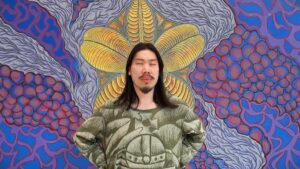Imagine the dreaded Zoom call: monotonous droning, endless PowerPoint slides, pairs of eyes dissociating in cyberspace. Now, imagine the opposite, or at least an absurdist doppelgänger.

Here’s one vision: A speaker whose sealed lips hold a mouthful of tea tries to read a paragraph aloud. Another attempts Madonna’s 1983 hit “Borderline” while several others improvise random words and phrases. Everyone is unmuted. All cameras are on. There is no hand raising. This is all happening simultaneously — so language dissolves.
“It sounds like a dream,” says JU-EH, the performance artist and opera singer conducting this “gathering / forum / game / performance / chat” from the Zoom square of a sun-washed white room of their home in the Nevada desert. They can’t hide their delight.
This was how on May 16 JU-EH initiated the first session, in virtual space, of “MilkTeaOperaHouse,” a four-part project — part of this year’s Twenty Summers series in Provincetown — that explores the origins and potential of the voice as a medium and mode of expression. The final session, a performance open to the public, will take place at the Hawthorne Barn, 25 Miller Hill Road, on Sunday, June 2 from 3 to 4:30 p.m.
This reporter joined that first virtual session as witness and participant. Let it be said that trying to speak while holding liquid in the mouth is no easy feat. It results in a series of syncopated hums and nasal grunts that form a sort of baseline rhythm or heartbeat to the group vocalization.
Recognizing voice as multi-dimensional and redefining the concept of an “opera house” are at the heart of the project. For JU-EH, it’s not just about opera as a musical genre but about reimagining opera as a dynamic gathering space outside the narrow timeframe of performance.
“I think the key for performing arts in the next 100 years is to look at how performers have come to terms with their voices in their daily lives,” says JU-EH.
The artist hopes to help people here find their creative voices. But a background in the performing arts is not a prerequisite for participation. “I just need people to come in with a certain degree of the unknown,” says JU-EH, emphasizing that every participant brings a rich, theatrical story with their voice.
JU-EH sees voice as its own oral history, with points of geographic and linguistic contact unique to the individual. “Voice is one of the best and shockingly interesting phenomena to play with when we talk about time and space,” they say.
For JU-EH, who was born Juecheng Chen in Canton, southern China, these include their mother tongue, Cantonese, an early education in Mandarin and English — the language of instruction at the Guildhall School of Music and Drama in London and the Mannes School of Music in New York — and Italian, the touchstone of Baroque opera, which they studied in The Hague and performed as a male soprano in Western Europe before moving to New York in 2015.
“This contrast made me naturally go down a path of being an initiator and trying to dig into something that no one has done or thought about before,” they say. “I want to try to awaken new mindsets.”
JU-EH says that the experience of being an Asian male soprano in Western Europe was alienating and caused them to reevaluate their professional goals. Moving to New York for graduate school allowed them to go in more experimental directions.
“In the last year at Mannes, I started to get entrepreneurial and creative and formed a beatboxing band,” says JU-EH. “In a set, I was doing old English songs by Dowland and Purcell as well as Radiohead — sort of reinventing Baroque music and the old repertoire.”
Hearing JU-EH speak or sing now reveals the layers of these experiences. “When you hear me, my voice or my words, they’re already gone,” says JU-EH. They compare it to observing stars: the brilliance perceived is old light, not a live experience. By the time a sound is processed and comprehended, it has already dissipated, leaving only vibrations that continue to resonate.
This perspective acknowledges how the past lives in the present, shapes future encounters, and honors one’s origins. This is what makes “MilkTeaOperaHouse” a personal encounter: “MilkTea” is not a random phrase but an intentional reference to JU-EH’s past and a desire to create a sense of comfort for participants. From London to Venice to New York, the act of getting a milk tea — a beverage that reminded them of growing up in China — was a tool for JU-EH to lessen their homesickness.
“These four words — milk, tea, opera, house — connect deeply to my identities and to what I want people to experience: a homecoming act, an encounter with the unknown, and a gathering place in the next century,” they say.
For JU-EH, the ultimate aim of “MilkTeaOperaHouse” is to create an ongoing experience that brings people into closer contact with their voices. The June 2 performance is thus not an end but a beginning — for participants, for the audience, and for JU-EH themself.
“It’s more about what got in, how it stayed, and how it may or may not reflect back,” says JU-EH. “Those are the fundamentals of vibration.”
Voice Across Dimension
The event: A site-specific public session of JU-EH’s “MilkTeaOperaHouse”
The time: Sunday, June 2, 3 p.m.
The place: Hawthorne Barn, 29 Miller Hill Road, Provincetown
The cost: Free; $20 suggested donation
